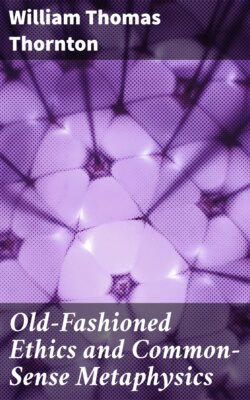Old-Fashioned Ethics and Common-Sense Metaphysics

Реклама. ООО «ЛитРес», ИНН: 7719571260.
Оглавление
William Thomas Thornton. Old-Fashioned Ethics and Common-Sense Metaphysics
Old-Fashioned Ethics and Common-Sense Metaphysics
Table of Contents
PREFACE
OLD-FASHIONED ETHICS. AND. COMMON-SENSE METAPHYSICS
CHAPTER I
ANTI-UTILITARIANISM. I
II
CHAPTER II
HISTORY'S SCIENTIFIC PRETENSIONS
CHAPTER III
DAVID HUME AS A METAPHYSICIAN
CHAPTER IV
HUXLEYISM
CHAPTER V
RECENT PHASES OF SCIENTIFIC ATHEISM
I
II
III
IV
CHAPTER VI
LIMITS OF DEMONSTRABLE THEISM
EPILOGUE
Footnote
BY THE SAME AUTHOR
ON LABOUR:
ITS WRONGFUL CLAIMS AND RIGHTFUL DUES; ITS ACTUAL PRESENT AND POSSIBLE FUTURE. SECOND EDITION
Отрывок из книги
William Thomas Thornton
With Some of Their Applications
.....
This, however, is all. In both the supposed cases, as in every one in which virtue consists of compliance with a painful duty, the pleasure arising from the practice of virtue cannot in strictness be called pleasure at all. At best it is but a partial negation of pain; more properly, indeed, the substitution of one pain for another more acute. Yet this mere negation, this ethereal inanity, is pronounced by Utilitarianism to be preferable to aught that can come into competition with it. Truly it is somewhat hard upon those who attend to such teaching, to be reproached with their grossness of taste and likened to hogs, for no better reason than their predilection for the lightest of all conceivable diets. Still harder will this seem, when we recollect that Utilitarians are exhorted to be virtuous, less for their own than for other people's sakes. If, indeed, virtue were practised by all mankind, the utilitarian idea of the greatest possible happiness, or, at least, of the greatest possible exemption from unhappiness, would be universally realised. Still, it is in order that they may afford pleasure to the community at large, rather than that they may obtain it for themselves; it is that they may save, not so much themselves, as the community, from pain, that individual Utilitarians are charged to be virtuous. Among those pleasures, whether positive or negative, which it is allowable to them to seek for themselves, the first place is assigned to the pleasure arising from the sense of giving pleasure to others. Thus, not only is it the purest of pleasures that Utilitarianism chiefly recommends for pursuit: even that pleasure is to be pursued only from the purest and most disinterested motives.
All this I frankly acknowledge; and I own, too, that, far from deserving to be stigmatised as irreligious, Utilitarianism is literally nothing else than an amplification of one moiety of Christianity; that it not adopts merely, but expands, 'the golden rule of Jesus of Nazareth,' exhorting us to love our neighbour, not simply as well, but better than ourselves; to do for others, not simply what we would have them do for us, but much more than we could have the face to ask them to do; not merely not to pursue our interests at the expense of theirs, but to regard as our own chief interest the promotion of theirs. That on account of these exhortations Utilitarianism is godless can be supposed by those only who suppose that love to one's neighbour is contrary to the will of God. By those who believe that works are the best signs of faith, and that love to God is best evinced by doing good to man, Utilitarianism might rather seem to be but another name for practical religion.
.....